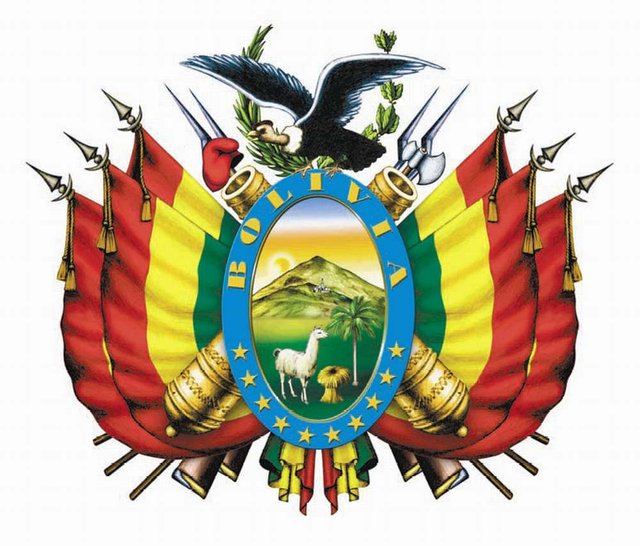Bolivia Coat of Arms!
It is elliptical in shape. At the top there is a rising sun appearing behind the Cerro de Potosí with the skyworks of the dawn. In its center the Cerro Rico de Potosí and the Cerro Menor. In the upper part of the minor hill, the chapel of the Sacred Heart of Jesus. In the bottom left of the set forming by the hills, a white flame. To his right, a bundle of wheat and a palm tree. Around it, the blue oval with a golden inner fillet.
In the upper half of the oval the inscription BOLIVIA in gold letters and in capital letters. In the lower half of the oval ten five-pointed stars in gold. To each side, three pavilions (national flags), a cannon, two rifles, an ax to the right and the cap of the freedom to the left. The Coat of Arms of the Andes rises in the attitude of raising the flight. Behind the condor, two intertwined branches of laurel and olive. The laurel to the left and the olive tree to the right making a crown. Where applicable, the field outside the Shield shall be pearl blue.
-The Condor of the Andes is the national bird of Bolivia and symbolizes the search for boundless horizons of the country.
-The Laurel symbolizes the triumph, the glory after the war.
-The olive tree symbolizes the peace and glory of the people.
-Pavilions refer to the three Tricolor Flags arranged on each side of the oval with their respective masts, the flag is the maximum national symbol.
-The arrangement of the rifles, symbolize the country's weapons. The Ax symbolizes the authority, the command of the country.
-Piece of artillery, symbolize the country's weapons.
-The Phrygian cap also known as Píleo, symbolizes those of freedom
-Oval whose field is blue in color, has the oblong elliptical form, contains in its lower part the ten golden stars and in the upper one the inscription BOLIVIA, in gold letters is read. Inside the oval is the golden fillet, its blue color symbolizes the Captive Litoral.
-Fillet is a narrow and long molding as a linear ornament.
-The Cerro Rico de Potosí, whose silver riches were discovered in 1545, was one of the richest silver mines in the world, symbolizing the richness of natural resources.
-Cerro Menor is associated with the whole of the Cerro Rico de Potosí, constituting itself as a kind of mountain altar, where the Chapel of the Sacred Heart rises.
-Chapel of the Sacred Heart of Jesus, is a construction made with Comanche granite and the image of the Sacred Heart of Jesus made of bronze that in the distance is confused by a cross since it is with open arms.
-The sun symbolizes the birth and splendor of the country.
-The sky with the colors of the dawn, symbolizes the birth and splendor of the country.
-The White Flame, symbolizes the richness of the country's fauna.
-The Bean of Wheat symbolizes the abundant food resources of the country.
-The Palm Janchi, Coco or Zunga, scientifically named Parajubaea Torally, symbolizes the country's plant wealth.
-The star symbolizes each of the Departments of Bolivia, including the Coast.


if you want more followers and upvotes for free
join now https://steemfollower.com/?r=2865